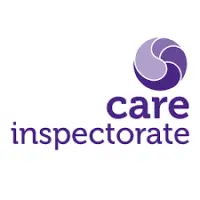The Care Inspectorate is the national regulator for care services in Scotland, formerly known as the SCSWIS. It’s aim is to register, inspect and rate services using a proportionate and targeted approach which drives high quality care, support and treatment.
Service providers are involved in shaping improvement through completing Annual Returns, which provide valuable data. The data enables the Care Inspectorate to target organisational improvement with a view to supporting health and social care providers.
Aims of the Care Inspectorate
Registers new services
Inspects services grading them on a 6 point scale
Uses a targeted approach, with closer attention on services that require improvement
Takes proportionate approach which is dependent on size and issues within an organisation
Takes enforcement action when necessary to drive improvement
Underpinning Principles
The key principles of the Care Inspectorate are to keep people safe whilst promoting dignity, respect, choice and independence.
Dignity and respect
Compassion
Inclusivity
Responsive care
Support and
well-being
Core Assurances
The Core Assurances provide guidelines essential for providers to support them in providing services which are safe, effective and responsive to peoples needs. They are the areas that inspectors look at on inspection of services.
General
- Registration certificate
- Insurance certificate
- Written statement of the aims and objectives
Protection
- This relates to both adult and child protection reflecting who the service is supporting
Infection prevention and control
- Training
- Governance
- Assessing risk
Medication system and records
- Safe medication management
- Good practice
- Medication errors and appropriate notifications
Management of people's finances
- Financial management
- Decision making
- Policies and procedures
Accident/incident records
- Recording of all accidents and incidents
Complaints
- Complaints and concerns management
- Learnings management
- Accessibility to complaints process
Staff recruitment procedures
- Safe and effective recruitment practices
Planned care and support
- The Personal Plan
- Involving people in care planning
- Accessibility of personal plans
Management oversight and governance
- Governance and oversight systems
Quality Framework - Self-Evaluation
Core Assurances (key areas essential to a service being safe).
Key Questions:
How well do we support people's well-being?
How good is our staff team?
What is the overall capacity for improvement?
Quality Themes
Quality of care and support
Quality of environment
Quality of management and leadership
Self-Evaluation
How well do we support people's well-being?
How good is our leadership?
How good is our staff team?
How good is our setting?
How well is our care planned?
Examples of Sources of Evidence of Provider Self-evaluation
Views of people experiencing care
Views of other stakeholders and professionals
Reviews and reviews of documents showing how decisions are made
Involving people who use services in the evaluation process
Information Required for Inspection
Examples of sources of evidence of provider self-evaluation
1.
Self-assessment form
2.
Health and Social Care Standards
3.
Complaints
4.
Notifications
5.
Enforcement actions updates
6.
Feedback from service users, their carers and families
7.
Feedback from staff - privately and in groups
8.
Talk to people using services privately and in groups
9.
Observe care (dependent on service)
10.
Observe activities happening on the day of inspection
11.
Examining information e.g. records and files
12.
Investigate service user choice
CareLineLive offers numerous features to support the day-to-day running of your business. Our assessments, eMAR, body maps and concern and incident reporting allow for excellent person-centred care planning. The built-in reports give ample opportunities to provide evidence for regulatory purposes. Our carer app facilitates real time information flow from carers out in the field so that you can deal with issues, reviews and updates in real time.


